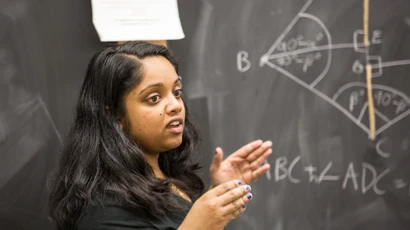
Department of Mathematical Sciences Student Learning Outcomes
Department Learning Objectives
Every course offered by the department will strive to:
- develop mathematical thinking and communication skills; and
- communicate the breadth and interconnections of the mathematical sciences.
In addition, courses taken primarily to satisfy general education requirements are designed to:
- engage students in a meaningful and positive intellectual experience;
- sharpen abilities in quantitative and logical reasoning needed for informed citizenship and productive employment; and
- encourage students to take additional coursework in the mathematical sciences.
Cognate courses for students majoring in partner disciplines will meet the needs of those disciplines and advance the students’ ability to:
- create, analyze, and interpret relevant mathematical models; and
- make sound arguments based on mathematical reasoning and careful data analysis.
Programs and courses for pre-service and in-service teachers, including graduate students, will help them develop:
- a deep understanding, appropriate to the level of certification, of numbers and operations, algebra and functions, geometry and measurement, and statistics and probability;
- knowledge of a broad range of explanations and examples, with facility for separating and reconnecting the component parts of concepts and methods; and
- the disposition, confidence, and motivation to pursue career-long mathematical growth.
Finally, programs and courses primarily for our majors aim to help students:
- progress from a procedural/computational understanding of mathematics to a broad understanding encompassing logical reasoning, generalization, abstraction, and formal proof; and
- gain experience in the careful analysis of examples and data, making appropriate use of graphing calculators, computer algebra systems, visualization software, and statistical packages.
For departmental assessment purposes, our Student Learning Outcomes are the following: Graduates will be able to
- Organize and analyze data and information and synthesize problem solutions using appropriate mathematical tools;
- Formulate conjectures, find counterexamples, and state and prove theorems carefully;
- Learn mathematics outside of the classroom through self-study or group-study, including the ability to refresh knowledge;
- Communicate mathematics effectively both orally and in writing;
- Use technology to aid in the above.
